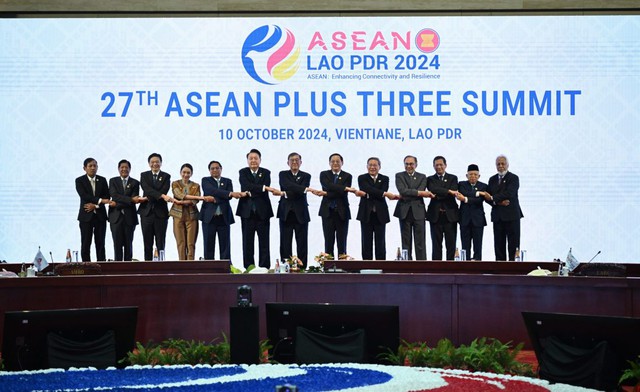Prime Minister attends 27th ASEAN Plus Three Summit
VGP - Vietnamese Prime Minister Pham Minh Chinh attended the 27th ASEAN Plus Three (APT) Summit in Vientiane, Laos on October 10.

Vietnamese Prime Minister Pham Minh Chinh, Chinese Premier Li Qiang, Republic of Korea's President Yoon Suk Yeol, Japanese Prime Minister Ishiba Shigeru and heads of ASEAN delegations at the ASEAN+3 Summit, Vientiane, Laos, October 10, 2024
Addressing the event, the Vietnamese Prime Minister emphasized that the prosperous development of ASEAN cannot be achieved without the connection, cooperation and support of the three Northeast Asian partners in the past, at present and in the future.
He took the occasion to call upon ASEAN and the three partners to (i) guarantee the connectivity of supply chains, (ii) boost new growth drivers like innovation, digital transformation, green transition, circular economy, sharing economy, and emerging sectors like artificial intelligence, semiconductor, cloud computing, and internet of things; and (iii) reinforce resilience against natural disasters and climate change.
Pham also underscored the importance of a peaceful, secure, and stable environment free from war, which is conducive to development for the APT countries and for the entire region, including Southeast Asia and Northeast Asia.
In resolving any issue, the most important factor is to respect international law, the United Nations Charter, and the 1982 United Nations Convention on the Law of the Sea, Pham stressed.
He called for candid dialogue, sincere cooperation, mutual trust and respect, peaceful settlement of disputes, joining hands to cope with global challenges and shape an open, inclusive and transparent regional architecture, upholding internationa law with ASEAN playing a central role and effective cooperation and assistance from China, Japan, and South Korea.
At the summit, leaders of the APT countries, including 10 ASEAN Member States, China, Japan, and South Korea, reaffirmed their commitment to further strengthening and deepening the APT framework, which plays a key role in fostering regional cooperation and addressing emerging issues.
The leaders also welcomed the progress of APT cooperation and discussed enhancing cooperation across various sectors.
They adopted an APT Statement on Strengthening the Connectivity of Regional Supply Chains in support of Lao PDR’s ASEAN Chairmanship theme this year.
According to the ASEAN+3 Macroeconomic Research Office (AMRO), APT economy is projected to expand 4.2 percent and 4.4 percent in 2024 and 2025, respectively.
In 2023, the two-way trade between ASEAN and the three Northeast Asian countries reached US$1.1 trillion while FDI flows from these countries to ASEAN amounted to US$42.8 billion.
APT leaders agreed to prioritize economic, trade and investment cooperation, effectively implement the Regional Comprehensive Economic Partnership (RCEP) Agreement.
The leaders underlined the importance of cooperation in strengthening the capacity and improving the effectiveness of the existing sectoral cooperation mechanisms in order to timely respond to and address non-traditional security challenges, transnational crime, food security, and health security.
The leaders reiterated their support for strengthening coordination to ensure public financial stability, fostering cooperation in the fields of innovation, digital transformation, energy transition, and climate change among others.
They also underscored the need to promote people-to-people exchanges as well as the role and values of the APT mechanism to make more positive contributions to peace, stability, coopration and development in the region./.

